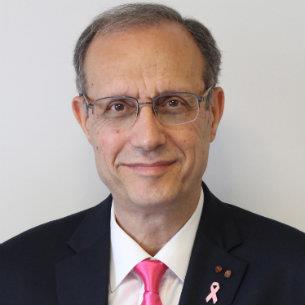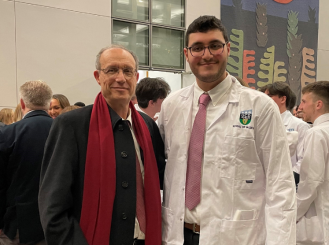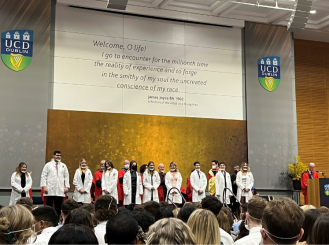Over the years, I have been to so many yearly white coat ceremonies for our medical students at the American University of Beirut, Beirut, Lebanon (@AUB_Lebanon), but this year it was different! I attended my own son Bassem’s white coat ceremony at the University College Dublin, Dublin, Ireland (@UCDMedicine), and I was seated in the parents’ section of the auditorium. I am always proud of the accomplishments of my students. Here in Dublin, I felt what it is to be a proud parent! I also liked that the name of the white coat ceremony at UCD is “clinical commencement.”
Although most medical schools do the white coat ceremony at entrance in the beginning of MED1 year, at AUB we hold it at the end of MED2 and beginning of clinical years starting MED3 of our 4-year medical school program. UCD’s clinical commencement is in the middle of MED2. At AUB, after introductory speeches by the dean and keynote speaker and the oath, students are called by name to come up to the stage and are helped into a white coat by a faculty member. At UCD it was a little different. Students are called up to the stage in groups of 10 and their coats are put on them by 10 faculty members. As we were just coming out of a COVID-19 surge, students were also given transparent face masks for the sake of souvenir pictures. A reception for students, parents, and faculty at the exit of UCD O’Reilly Auditorium was a lot of fun. Happiness was radiant. Students have already known each other for at least 1.5 years. They were able to go back and forth, in and out of the auditorium’s stage and enjoyed chatting and taking pictures together as well as with their families. As expected, after dinner with their families, students went out together on the town!
After becoming part of the medical community by virtue of enrolling in medical school, and in preparation for their long-awaited clinical years, students are reminded of why we go into medicine and congratulated on their hard studying and achievement.
Among other lessons, we tell them:
- Always remember, you will take care of patients, not diseases.
- Get ready to meet your first patients. Respect your patient. Take time and listen to your patient. Hear about their complaints. Watch your team interns, residents, and attendings in every step of history taking and performance of a proper physical examination. Each and every complaint and physical finding will trigger a chain of thoughts in your brain, and make you recall much of what you have learned in your preclinical years and what you will start accumulating as experience during your clinical years. You will learn how to put it all together, make conclusions, order appropriate diagnostic tests, and make management and treatment recommendations. Get ready to see patients in outpatient clinics, encounter hospitalized patients, hospital in-patient walking rounds, go into operating rooms, recovery rooms, delivery rooms, pediatric wards, intensive care and coronary care units, emergency rooms, and many others. You will discover the art of interpreting radiology films and shadows, microscopic evaluation of tissue biopsies, and surgical pathology.
- Depending on your rotation schedules you may have ample time or little time to attend clinical lectures as well as talks on special advances and research, but you should make every effort to attend, especially multidisciplinary conferences and tumor boards. Do not be shy at rounds or conferences. Read, listen, and actively participate in discussions. You will learn, point out questions, answer some, learn from your attendings and fellow students. You will soon find out that there are still many unanswered questions in medicine that require research. You will learn that some diseases are preventable. Advanced stages of disease can be avoided by community awareness and early detection. You will realize that some communities are disadvantaged and require more attention.
- You will learn multitasking. You will learn and practice decision-making. You will see patients at the stage of diagnosis, patients getting treatments, patients improving, patients having complications, patients requiring supportive treatment, patients requiring palliation of their symptoms. You will realize that you have important roles in every step of patient care and disease management. Remember to ask and consult those with more experience. It is okay not to know certain things at your level, but it is not okay not to ask.
- It is true that you will be at the hospital to learn, but you are also there to take care of patients. You will become part of the medical team taking care of patients, searching for solutions for unanswered questions and unmet patient and community needs.
You will soon realize that as physicians, we are all teachers and eternal students. Many of you also become researchers and discoverers as well. You are the future of medicine. Enjoy your clinical years—you will realize along the way how much it is rewarding to be a physician! Congratulations!





Recent posts